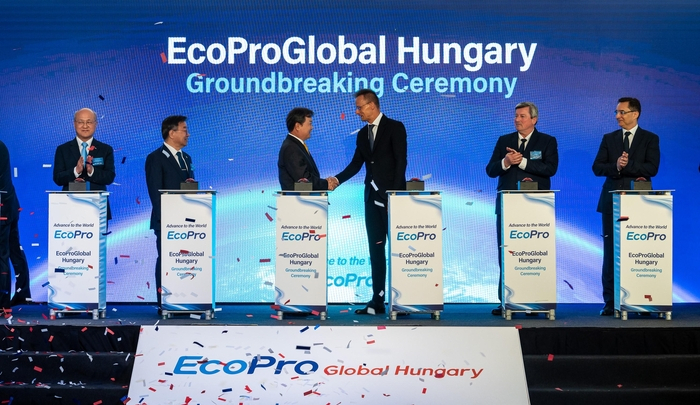
South Korean battery materials firm EcoPro said Monday it is poised to build a cathode manufacturing plant in Hungary, seeking to establish its footing in the burgeoning European electric car market.
Under the 382.7 billion won ($287.2 million) investment, the company plans to produce 108,000 tons of cathodes annually, capable of supplying some 1.35 million electric vehicles.
The plant is set to start production in 2025 after completing construction next year. EcoPro’s subsidiaries linked to the cathode production business, including EcoPro BM, EcoPro Innovation and EcoPro AP, will back the construction process.
EcoPro Chairman Lee Dong-chae, Hungary's Minister of Foreign Affairs and Trade Peter Szijjarto, South Korean Ambassador to Hungary Hong Gyu-duck, Laszlo Papp, mayor of the Hungarian city of Debrecen, and some 100 executives and government officials participated in the groundbreaking ceremony held at Debrecen on Friday.
Starting with the Hungary project, EcoPro said it is looking to expand its presence in Europe.
In particular, a cathode materials value chain called Closed Loop Ecosystem will be created within the Hungary plant, just like in the company's plant in the eastern coastal city of Pohang, North Gyeongsang Province, the company said.
The Eco-battery Pohang Campus produces high-nickel cathodes based on an all-in-one value chain that recycles used batteries, manufactures key raw materials for cathodes, produces the final product cathodes and supplies high-purity oxygen and hydrogen.
According to market tracker SNE Research, the global market size of the four materials for lithium-ion batteries -- cathode, anode, electrolyte and separator -- is estimated to expand up to $147.6 billion by 2030. Competition among South Korean, Chinese and Japanese battery makers, who take up 90 percent of the market share, is expected to grow fiercer, it said.










![[Hello India] Hyundai Motor vows to boost 'clean mobility' in India](http://res.heraldm.com/phpwas/restmb_idxmake.php?idx=644&simg=/content/image/2024/04/25/20240425050672_0.jpg&u=)









